GBA PD iPSC7
PNUSCRi001-A
General
Cell Line |
|
| hPSCreg name | PNUSCRi001-A |
| Cite as: | PNUSCRi001-A (RRID:CVCL_C1VH) |
| Alternative name(s) |
GBA PD iPSC7
|
| Cell line type | Human induced pluripotent stem cell (hiPSC) |
| Similar lines |
CBIGi041-A-1 (IPSC0054, GBA L444P (CBIGi041-A) correction) Donor's gene variants: GBA, GBA Donor diseases: Parkinson Disease CBIGi042-A-1 (GBA E326K (CBIGi042-A) correction, IPSC0056) Donor's gene variants: GBA, GBA Donor diseases: Parkinson Disease CBIGi041-A (IPSC0053, GBA L444P (CBIGi041-A)) Donor's gene variants: GBA, GBA Donor diseases: Parkinson Disease CBIGi042-A (IPSC0055, GBA E326K (CBIGi042-A)) Donor's gene variants: GBA, GBA Donor diseases: Parkinson Disease CBIGi045-A (GBA L444P(CBIGi045-A), IPSC0077) Donor's gene variants: GBA, GBA Donor diseases: Parkinson Disease CBIGi002-A (2890 (GBA W378G, heterozygous), 2890, IPSC0001) Donor's gene variants: GBA, GBA, GBA Donor diseases: Parkinson Disease LCSBi017-A (M1 Cl6b, #89721) Donor's gene variants: GBA1, GBA1, GBA1, GBA1 Donor diseases: Parkinson Disease CBIGi002-A-1 (GBA W378G-correction/2890, 2890-iso, IPSC0002) Donor's gene variants: GBA, GBA, GBA Donor diseases: Parkinson Disease CBIGi039-A-1 (IPSC0051, LRRK2 R1441H(CBIGi039-A) correction) Donor's gene variants: LRRK2, LRRK2 Donor diseases: Parkinson Disease CBIGi044-A-1 (IPSC0059, LRRK2 N551K (CBIGi044-A) correction) Donor's gene variants: LRRK2, LRRK2 Donor diseases: Parkinson Disease |
| Last update | 15th August 2022 |
| User feedback | |
Provider |
|
| Generator | Pusan National University: Convergence Stem Cell Research Center (PNUSCR) |
| Owner | Pusan National University: Convergence Stem Cell Research Center (PNUSCR) |
| Derivation country | South Korea |
External Databases |
|
| BioSamples | SAMEA110465759 |
| Cellosaurus | CVCL_C1VH |
| Wikidata | Q114312679 |
General Information |
|
| Publications |
|
| * Is the cell line readily obtainable for third parties? |
Yes Research use: allowed
Clinical use: not allowed
Commercial use: not allowed
|
Donor Information
General Donor Information |
|
| Sex | male |
| Age of donor (at collection) | 55-59 |
| Ethnicity | Asian |
Phenotype and Disease related information (Donor) |
|
| Diseases | A disease was diagnosed.
|
| Disease associated phenotypes |
|
External Databases (Donor) |
|
| BioSamples | SAMEA110469922 |
Ethics
| Has informed consent been obtained from the donor of the embryo/tissue from which the pluripotent stem cells have been derived? | Yes |
| Was the consent voluntarily given? | Yes |
| Has the donor been informed that participation will not directly influence their personal treatment? | Yes |
| Can you provide us with a copy of the Donor Information Sheet provided to the donor? | No |
| Do you (Depositor/Provider) hold the original Donor Consent Form? | Yes |
| Alternatives to consent are available? | No |
| Is there other documentation provided to the donor for consenting purposes? | No |
| Confirm that consent was obtained by a qualified professional | Yes |
| Has the donor agreed to be re-contacted? | Unknown |
| Has the donor been informed about how her/his data will be protected? | Yes |
| Please indicate whether the data associated with the donated material has been pseudonymised or anonymised. | pseudonymised |
| Does consent explicitly allow the derivation of pluripotent stem cells? | Yes |
| * Does consent expressly prevent the derivation of pluripotent stem cells? | No |
| * Does consent pertain to a specific research project? | No |
| Does consent permit unforeseen future research, without further consent? | No |
| Does the consent permit uses of donated embryo/tissue or derived cell line intended for clinical treatment or human applications? | No |
| Does consent expressly permit storage of donated embryo/tissue for an unlimited time? | Yes |
| Does consent expressly permit storage of cells derived from the donated embryo/tissue for an unlimited time? | Yes |
| Does consent prevent the DONATED BIOSAMPLE from being made available to researchers anywhere in the world? | No |
| Does consent prevent CELLS DERIVED FROM THE DONATED BIOSAMPLE from being made available to researchers anywhere in the world? | No |
Does consent permit research by | |
| an academic institution? | Yes |
| a public organisation? | No |
| a non-profit company? | No |
| a for-profit corporation? | No |
| Does consent expressly permit collection of genetic information? | Yes |
| Does consent expressly permit storage of genetic information? | Yes |
| Does consent prevent dissemination of genetic information? | Yes |
| How may genetic information associated with the cell line be accessed? | Controlled Access |
| Will the donor expect to receive financial benefit, beyond reasonable expenses, in return for donating the biosample? | No |
| Does the consent permit the donor, upon withdrawal of consent, to stop the use of the derived cell line(s) that have already been created from donated samples? | Yes |
| Does the consent permit the donor, upon withdrawal of consent, to stop delivery or use of information and data about the donor? | Yes |
| Has a favourable opinion been obtained from a research ethics committee, or other ethics review panel, in relation to the Research Protocol including the consent provisions? | Yes |
| Name of accrediting authority involved? | Pusan National University Hospital |
| Approval number | 05-2021-009 |
| Do you have obligations to third parties in regard to the use of the cell line? | No |
| Are you aware of any further constraints on the use of the donated embryo/tissue or derived cells? | No |
| Is there an MTA available for the cell line? | No |
| For generation of the cell line, who was the supplier of any recombined DNA vectors or commercial kits used? | Invitrogen |
hIPSC Derivation
General |
|
| Source cell type |
Mononuclear cells collected from peripheral blood.
Synonyms
|
| Source cell origin |
A small volume of blood removed for testing or storage.
Synonyms
|
| Age of donor (at collection) | 55-59 |
| Collected in | 2022 |
Reprogramming method |
|
| Vector type | Non-integrating |
| Vector | Sendai virus |
| Is reprogramming vector detectable? |
No |
| Methods used |
PCR
|
Vector free reprogramming |
|
| Type of used vector free reprogramming factor(s) |
None
|
Other |
|
| Selection criteria for clones | Morphological criteria. We selected embryonic stem cell-like clones with compact and brigh edges using a glass microcapillary. |
| Derived under xeno-free conditions |
Yes |
| Derived under GMP? |
No |
| Available as clinical grade? |
No |
Culture Conditions
| Surface coating | Matrigel/Geltrex |
| Feeder cells |
No |
| Passage method |
Enzyme-free cell dissociation
EDTA
|
| CO2 Concentration | 5 % |
| Medium |
Essential 8™
|
| Has Rock inhibitor (Y27632) been used at passage previously with this cell line? | No |
| Has Rock inhibitor (Y27632) been used at cryo previously with this cell line? | Yes |
| Has Rock inhibitor (Y27632) been used at thaw previously with this cell line? | Yes |
Characterisation
Analysis of Undifferentiated Cells
| Marker | Expressed | Immunostaining | RT-PCR | Flow Cytometry | Enzymatic Assay | Expression Profiles |
| POU5F1 (OCT-4) |
Yes |
|||||
| NANOG |
Yes |
|||||
| TRA 1-60 |
Yes |
|||||
| SSEA-4 |
Yes |
|||||
| SOX2 |
Yes |
Differentiation Potency
In vitro spontaneous differentiation
In vitro spontaneous differentiation
In vitro spontaneous differentiation
Genotyping
Karyotyping (Cell Line) |
|
| Has the cell line karyotype been analysed? |
Yes
|
Other Genotyping (Cell Line) |
|

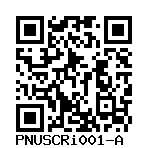
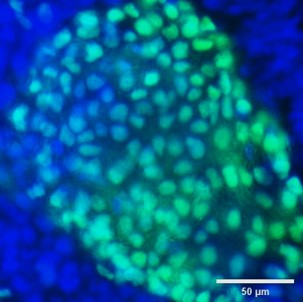
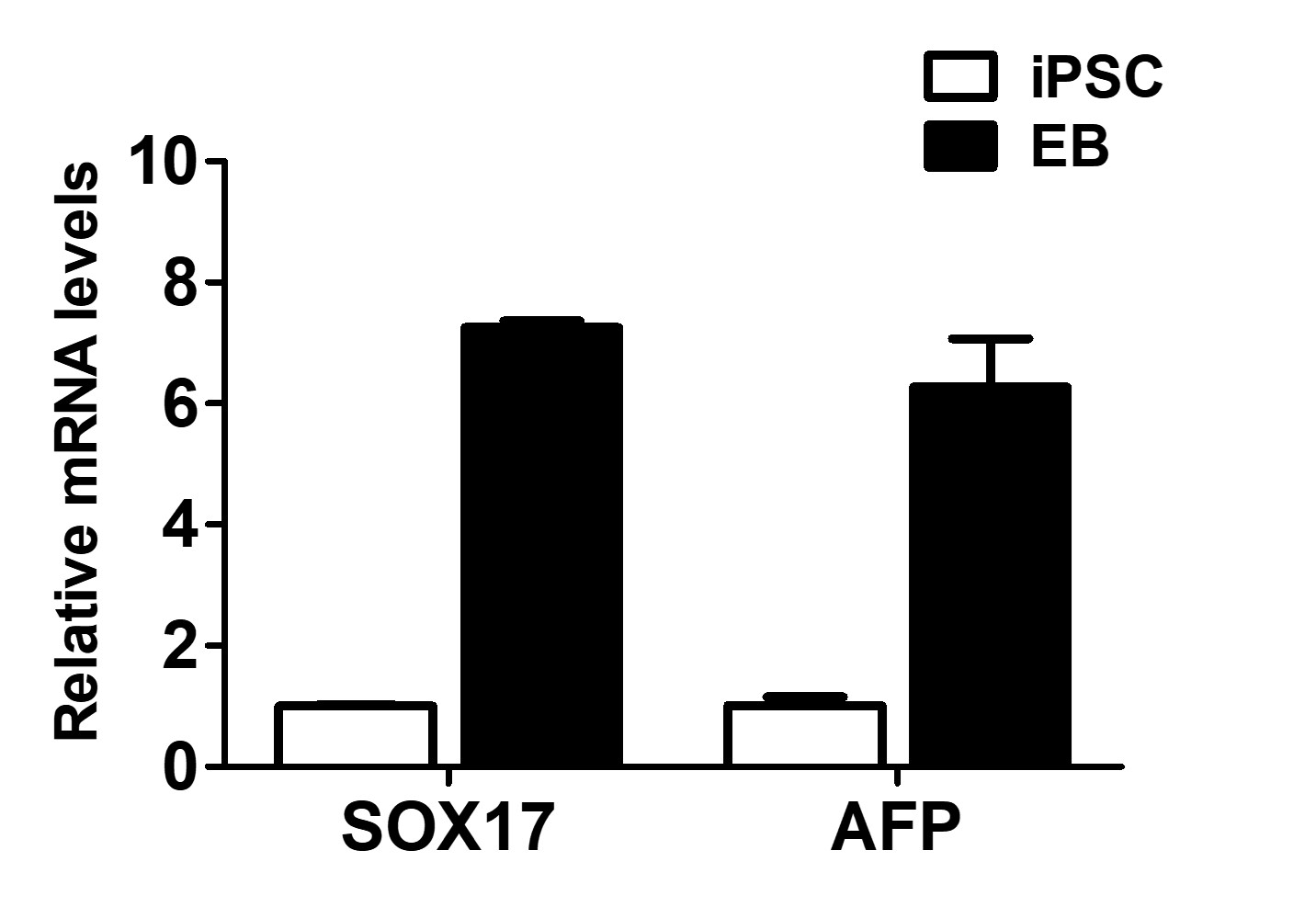
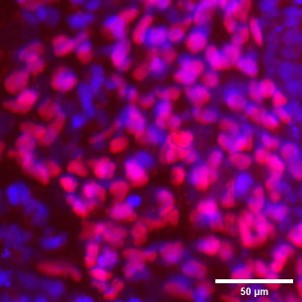
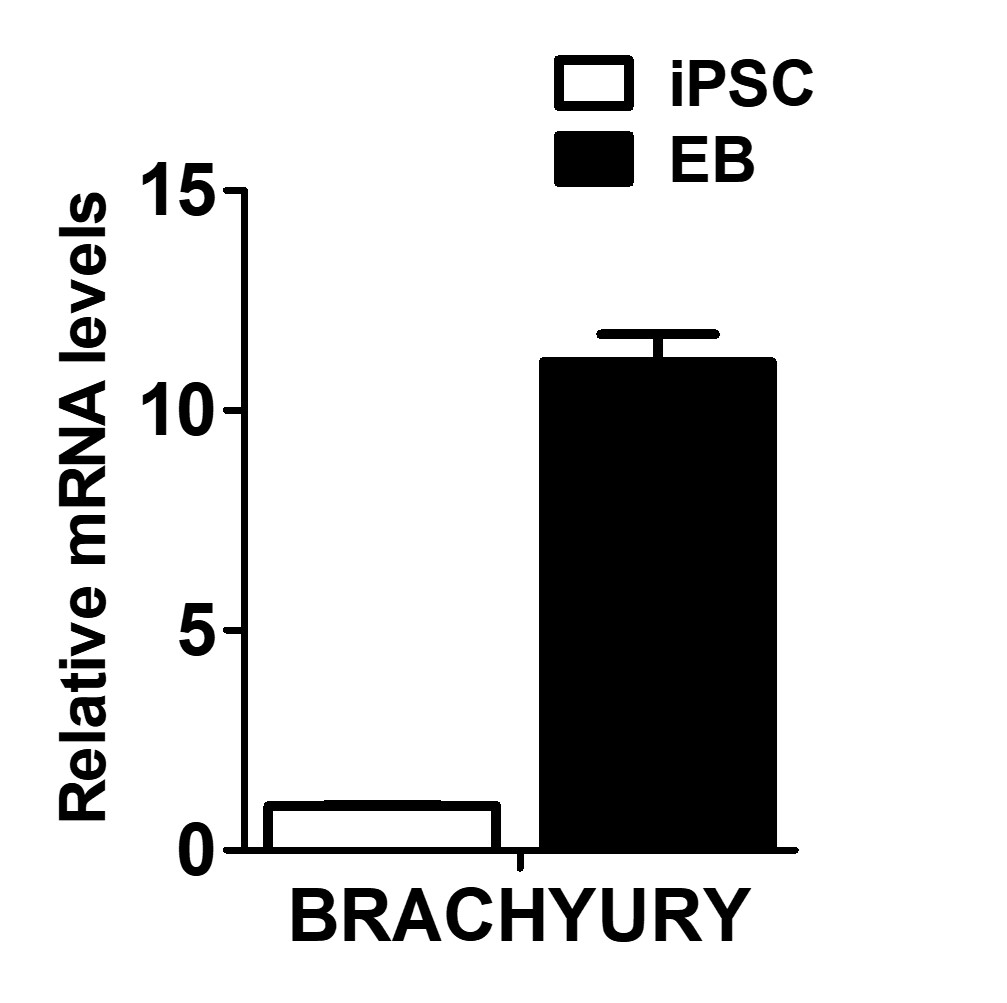
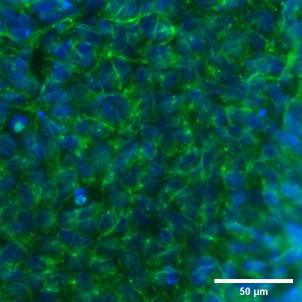

Login to share your feedback, experiences or results with the research community.